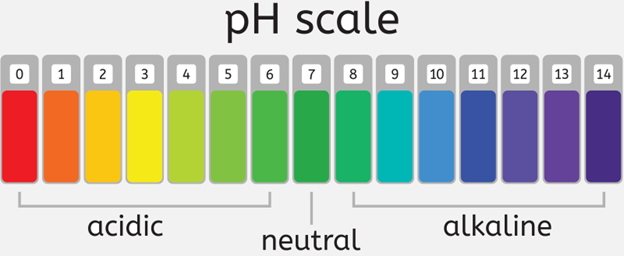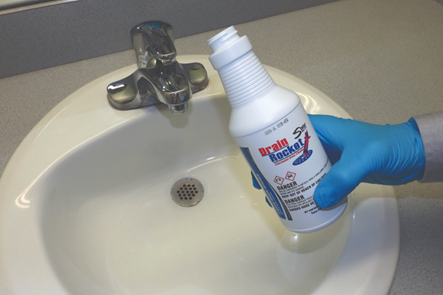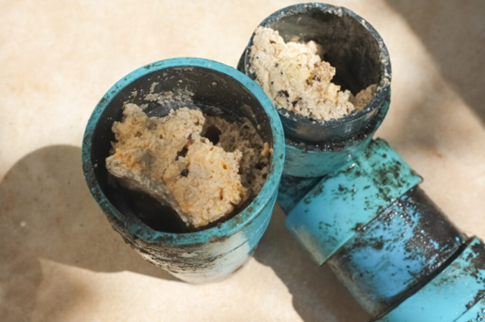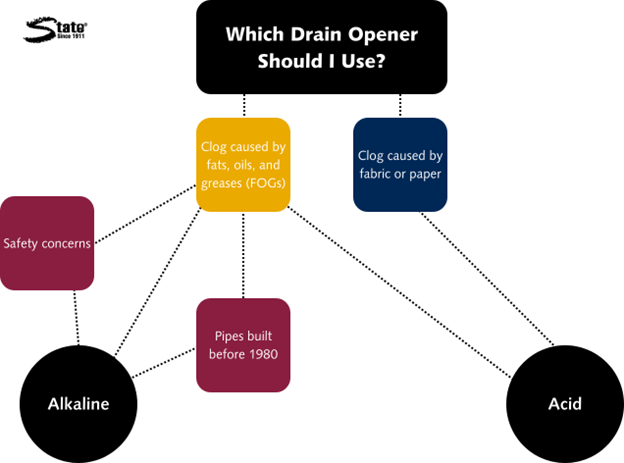Acid vs. Caustic Drain Opener
Acid vs. Caustic Drain Opener
Drain clogs are one of the most frustrating problems your facility might deal with, especially if they seem to just keep happening. When you’re looking for the right drain opener to solve your issue, there are two categories you’ll likely encounter: acid and alkaline (also known as caustic). But what are acid and alkaline chemicals?
At State Chemical, we sell both acid and alkaline drain openers. We have firsthand experience designing, manufacturing, and using them, as well as teaching clients how to use them. While it can be tricky to understand which one you need, we know from personal experience that the correct option for you is out there.
To provide you with the most accurate information, we’ve compared acid and alkaline drain openers and explained when you might use one over the other. After reading, you’ll have a better idea of which option is best fit for your drain clogs.
What is an Acid Drain Opener?
An acid drain opener works by dissolving the clog in your drain so that it can easily pass through. Acids are remarkably effective, but they should only be used in severe cases.
One drawback to acid drain openers is that they are very harsh on your pipes. Because they’re so strong, they can damage weak pipes or wear down healthy pipes over time.
Similarly, acid drain openers are hazardous to the handler. If the user accidentally comes into contact with the acid, they could face severe chemical burns and breathing difficulties. When handling, it is critical that you wear personal protective equipment (PPE), but even with PPE, you could still face injuries if the acid is mishandled.
When Should You Use an Acid Drain Opener?
This begs the question: when are acid drain openers your only option?
The answer is for clogs caused by fabrics or paper products. This might include diapers, wipes (even flushable wipes will build up over time), and bed sheets. In these situations, alkaline drain openers aren’t powerful enough to melt clogs. However, acids will do the trick.
For example, let’s say you’re a prison’s head custodian. Recently, your facility has been dealing with backups caused by inmates flushing bed sheets down the toilets. You have to keep the facility up and running, but it’s getting hard when these clogs seem to be happening every week.
This is the perfect example of when to use an acid drain opener. If you buy a case, you can burn through the clog every time there’s an issue, and your whole facility won’t have to shut down because of it.
What is a Caustic Drain Opener?
How do alkaline drain openers compare?
Alkaline drain openers are also known as heat-generating drain openers and as caustic drain openers. Typically containing sodium hydroxide, alkaline drain openers work by generating intense heat once they hit the water to melt clogs. Once melted, these clogs will easily pass through the pipes.
Heat-generating drain openers are widely considered a safer option than acids—both for you and your pipes—but you still need to be careful when using them.
Sodium hydroxide can still cause corrosive burns to the user as well as respiratory problems. Wear PPE, take all proper precautions when handling, and stand back from the drain after using. Caustic drain openers can have a violent reaction when they hit the clog, and if this reaction splashes back at you, you’ll be injured.
Similarly, alkaline drain openers may cause harm to some drains. This is less likely than with acid, but you should still be careful about using them in certain plastic pipes and drain hoses.
When Should You Use an Alkaline Drain Opener?
As compared to acids, you should use alkaline drain openers for standard clogs. This means clogs caused by organics, soap scum, and fats, oils, and greases (FOGs). The intense heat generation caused by alkaline drain openers melts the FOGs quickly and easily.
Meanwhile, acids would dissolve the FOGs, but they would do so less efficiently, and their strength is unnecessary for less severe clogs. Think of it like using a hammer to kill a housefly. It’ll work, but why waste energy and cause potential property damage when you have other options?
If you can avoid using an acid, always use an alkaline drain opener for both your safety and the safety of your pipes. No chemical is perfectly safe to handle, but alkaline drain openers are much less severe.
Which Drain Opener Should I Choose?
This begs the question: which drain opener is best for you?
Consider the severity of your clog. If you’re dealing with a bad clog, such as one caused by fabric or paper products, acids are your only option. Meanwhile, if you’re experiencing a standard clog, alkaline chemicals will solve the issue more safely and efficiently.
Also consider the condition of your pipes. If your pipes were installed before 1980, they’re likely weakened and experiencing corrosion. These are cases where you definitely don’t want to use acid; the risk of damage is too great.
Similarly, consider your safety preferences. Are you nervous about your staff being injured? Are you unsure of your ability to properly train them in using harsh chemicals? In these cases, alkaline drain openers are a better choice, but you can also explore drain snakes or hydro-jetting if you’d rather avoid harsh chemicals altogether.
Your Next Steps
Dealing with drain clogs is frustrating, especially when you aren’t sure what will best unclog your drain. Now that you know whether an acid or caustic drain opener is a better choice for your facility, your next step is to consider exploring the best State Chemical products to unclog your drain.













